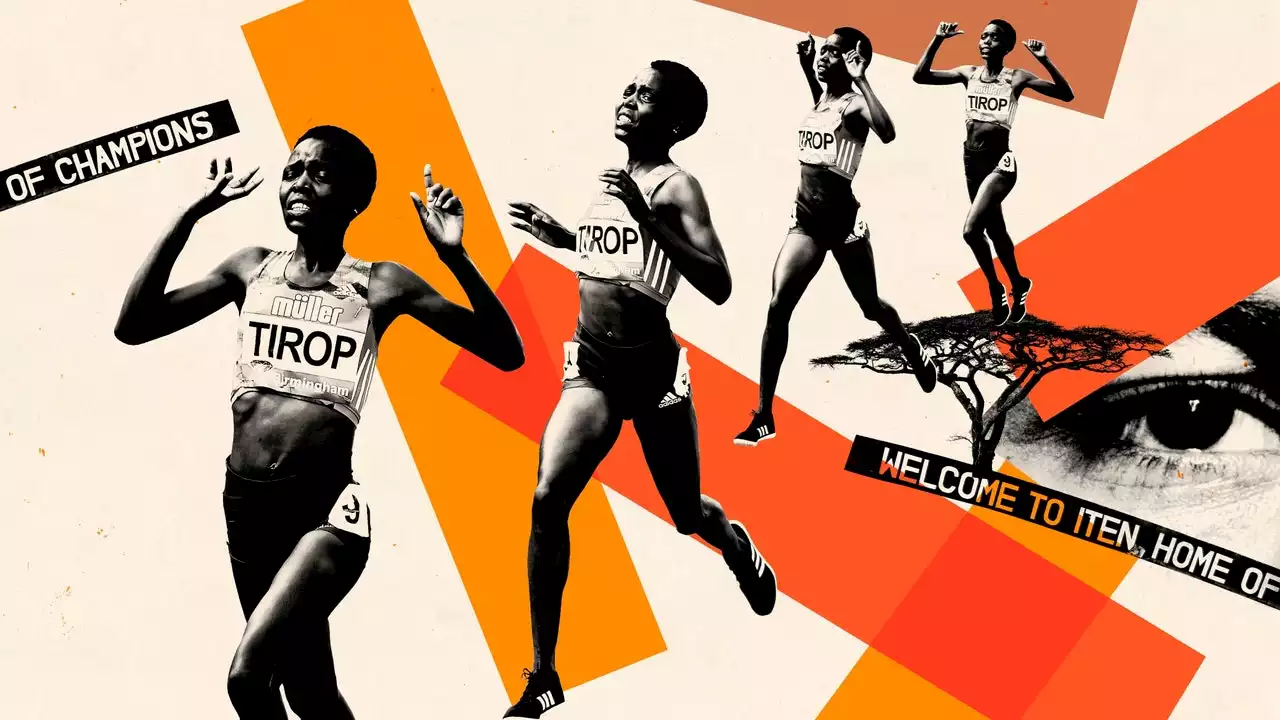A tiny town in Kenya became the long-distance-running capital of the world. Then, in a span of six months, two élite athletes were found dead.
When Agnes Tirop was eleven, she was already as fast as athletes twice her age. “She loved running, and she shined,” her brother Martin told me. Tirop, who was born in 1995, was small-boned and delicate-featured, with cropped hair. Even as a child, she was self-possessed, with a singular focus on improving her speed.
When Tirop was in secondary school, she met a man named Ibrahim Rotich, who was about fifteen years older. Rotich was a big, charming man, and he offered to manage and coach Tirop. Tirop already had a coach, and Rotich seemed, to Tirop’s family, to have little formal experience, but Tirop accepted his offer. Tirop’s sisters later observed Rotich driving her around, acting like her coach.
Tirop’s friends and family began to worry that she was falling into a pattern that was disturbingly common among female runners in Iten. “The husbands expect them to bring home money,” Njeri Migwi, the executive director of Usikimye, an advocacy group that focusses on gender-based violence, told me. “The minute they want certain levels of independence, the men abuse them.” Around 2018, Tirop reconnected with her family. She had Martin work as her pacemaker. Rotich was always around.
Running is Kenya’s most well-known pastime. Some of this national affinity might have biological roots. People in the Kalenjin ethnic group, and particularly those in the Nandi subgroup, who live in the Great Rift Valley, have developed—likely as a result of centuries at high elevation—deeper-than-average lung capacities, bigger and more numerous red blood cells , and lower body masses. Onywera told me that he has found similar traits in Ethiopian communities that also live in the Rift Valley.
At first, only men ran competitively. But in 1984 the first Olympic women’s marathon was held in Los Angeles. “Kenyan women started to dominate in the nineties, when they were being recruited by American universities,” Kimaiyo said. Tegla Loroupe, a woman from the Great Rift Valley, won the New York marathon in 1994. But, when Kenyan women began to bring home significant prize money, they got a mixed reception.
United States Latest News, United States Headlines
Similar News:You can also read news stories similar to this one that we have collected from other news sources.
 Why Stephen King Doesn't Write Sequels (& Why He Still Has)Stephen King has avoided writing sequels to most of his works, and he has a good reason for that, though he has still written a couple of follow-ups.
Why Stephen King Doesn't Write Sequels (& Why He Still Has)Stephen King has avoided writing sequels to most of his works, and he has a good reason for that, though he has still written a couple of follow-ups.
Read more »
 Arbitrum Governance Fracas Reopens the Question: Why DAOs?What exactly does crypto want DAOs to be? DanielGKuhn explores the idea that these tech-powered social organizations could grow into entities that rival traditional LLCs and government institutions.
Arbitrum Governance Fracas Reopens the Question: Why DAOs?What exactly does crypto want DAOs to be? DanielGKuhn explores the idea that these tech-powered social organizations could grow into entities that rival traditional LLCs and government institutions.
Read more »
 Why severe weather this year has been so destructive and deadly | CNNThere have been 494 tornado reports so far in 2023 – nearly double the average at this point in the year – and many of these storms have occurred outside 'Tornado Alley'
Why severe weather this year has been so destructive and deadly | CNNThere have been 494 tornado reports so far in 2023 – nearly double the average at this point in the year – and many of these storms have occurred outside 'Tornado Alley'
Read more »
 Why one Tenn. Republican voted against all three expulsions of Dem lawmakersRep. Charlie Blaum, a Republican who represents a Nashville suburb, said he preferred working with the Tennessee Three to make the House rules clearer.
Why one Tenn. Republican voted against all three expulsions of Dem lawmakersRep. Charlie Blaum, a Republican who represents a Nashville suburb, said he preferred working with the Tennessee Three to make the House rules clearer.
Read more »
 John Carpenter Is Right To Hate Rob Zombie's Halloween Remake (Here's Why)Rob Zombie's Halloween remake wasn't well-received by John Carpenter, and he's right in his criticism of what Zombie did to the story.
John Carpenter Is Right To Hate Rob Zombie's Halloween Remake (Here's Why)Rob Zombie's Halloween remake wasn't well-received by John Carpenter, and he's right in his criticism of what Zombie did to the story.
Read more »
